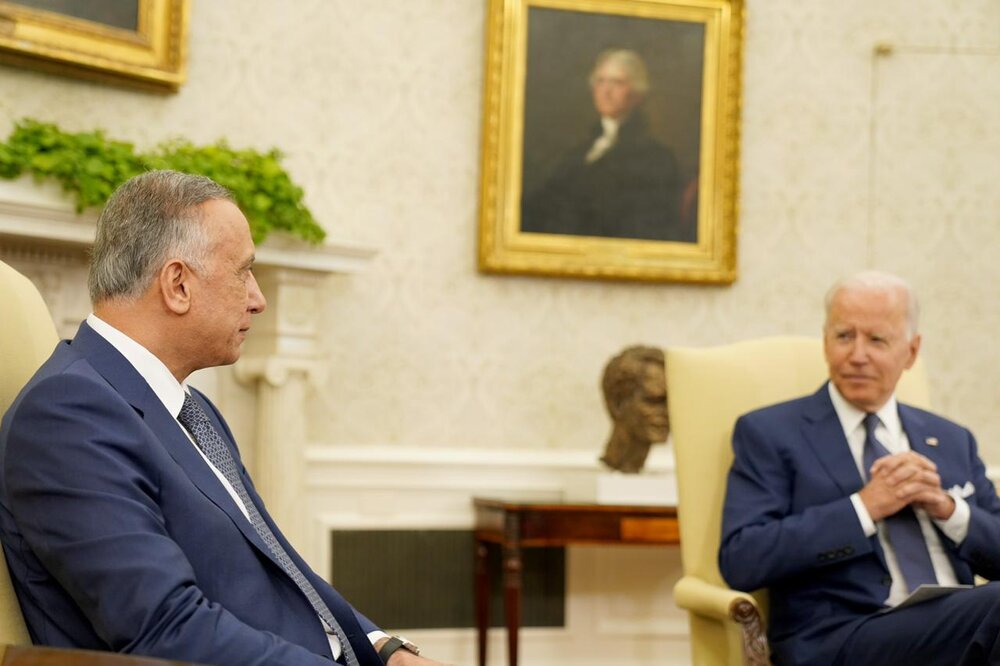U.S. fails to meet Iraqi demands on troops withdrawal
TEHRAN – Leaders of Iraq and the United States have sealed an agreement on ending the latter’s combat mission in Iraq. Many Iraqi political circles have cautiously welcomed the deal, though it stopped short of ending the U.S. military presence in Iraq.
These circles still harbor premonitions about a U.S. plot to use the deal in justifying the continuation of its military presence in Iraq under the pretext of training the country’s military personnel.
The deal was reached during a visit by Iraqi Prime Minister Mustafa al-Kadhimi to Washington, where he met U.S. President Joe Biden as part of a strategic dialogue between Iraq and the U.S.
“I’ve been in — I’ve been in contact with Kadhimi. I have — anyway, I think things are going well. Our role in Iraq will be as a — dealing with not — it’s just to be available, to continue to train, to assist, to help, and to deal with ISIS as it — as it arrives. But we’re not going to be, by the end of the year, in a combat mission,” Biden told reporters after he and al-Kadhimi met.
The Iraqi prime minister confirmed the deal in a statement issued following his meeting with the U.S. president. The statement said al-Kadhimi discussed with Biden “various aspects of strengthening relations between the two countries in all security, economic, cultural, educational and health fields.”
It added that the two sides affirmed the transition of the security relationship between Baghdad and Washington to the tasks of consulting, training, supporting Iraqi military capacity-building, providing technical support to the Iraqi armed forces, and the absence of combat forces by December 31 of this year.
The deal came after more than a year of continual campaign on the part of Iraqi political groups to demand a complete U.S. withdrawal of troops from Iraq. This campaign began early last year when the U.S. army assassinated two prominent Iranian and Iraqi generals near the Baghdad airport. The generals, IRGC’s Quds Force Commander Qassem Soleimani and Deputy Head of Iraq’s Popular Mobilization Forces Abu Mahdi al-Mohandes, were targeted by U.S. drones in the early days of 2020. A few days after the U.S. strike, the Iraqi parliament passed a bill obligating the Iraqi government to work in the direction of expelling all foreign troops from the country. In the ensuing months, the legislation sank into oblivion as angry protesters in southern Iraq brought down the government of Adel Abdul-Mahdi.
However, the political groups continued to insist on the withdrawal of U.S. troops even as al-Kadhimi took the helm in Baghdad. As the interim government of al-Kadhimi went forward with Iraq’s strategic dialogue with the U.S. the Iraqi negotiators faced growing calls for the U.S. withdrawal.
When al-Kadhimi and Biden announced the deal on withdrawal these calls seemed to have borne fruit. But a closer look at the announcement in that regard reveals that the deal may fall short of Iraqis' expectations on the U.S. withdrawal. For example, the Iraqis have long demanded a complete withdrawal of all U.S. troops from Iraq. But Biden explicitly said that the American troops will continue to be in Iraq in an advisory role.
This is by no means a concession to Iraq because the country is already stable and does not need any U.S. combat troops on the ground.
Furthermore, the deal does not meet the Iraqi demand of putting an end to U.S. arbitrary use of Iraq’s airspace. This was on full display during the drone strike that targeted al-Mohandes and General Soleimani. When asked about the U.S. use of Iraq’s airspace, former Iraqi Prime Minister Adel Abdul-Mahdi complained that “U.S. drones and helicopters roam the skies over Baghdad without official permission.”
Perhaps the most accurate report about the U.S. superficial withdrawal came from The New York Times which said that the U.S.-Iraq deal will not lead to a withdrawal of American troops from Iraq. Instead, their mission will be changed from maintaining a presence on the frontlines to training Iraqi troops behind the frontlines. Citing Pentagon officials, the Times said the U.S. appears to be agreeing to the Iraqi prime minister's request to set a date for the withdrawal of its troops from Iraq, but the troop levels in Iraq will remain at their current level of about 2,500.
The Iraqi Parliament’s Security and Defense Committee confirmed that the U.S. will maintain its troops in Iraq but with a redefined mission.
Mahdi Taqi Amerli, a member of the committee, told Iraqi news website Baghdad Today that “From the beginning, we know very well that the United States of America does not want a military withdrawal from Iraq, and it is working to delay this matter, with many pretexts and justifications that do not exist on the ground. That is why it wants the strategic dialogue with the Iraqi government to find a new pretext for the retention of its forces in the country.”
He pointed out that “the political forces, as well as the resistance factions, will not accept any American presence on the territory of Iraq, whatever the excuse of those forces, and we in the Iraqi parliament, we will closely monitor the results of the dialogue as well as the actual implementation of the American withdrawal in Iraq, otherwise we will take a firm stand against the procrastination of this file, whether by the Americans or the Iraqi government.”
He made the remarks after Western media outlets reported that the U.S. intends to announce the withdrawal of its troops on paper.


No comments:
Post a Comment